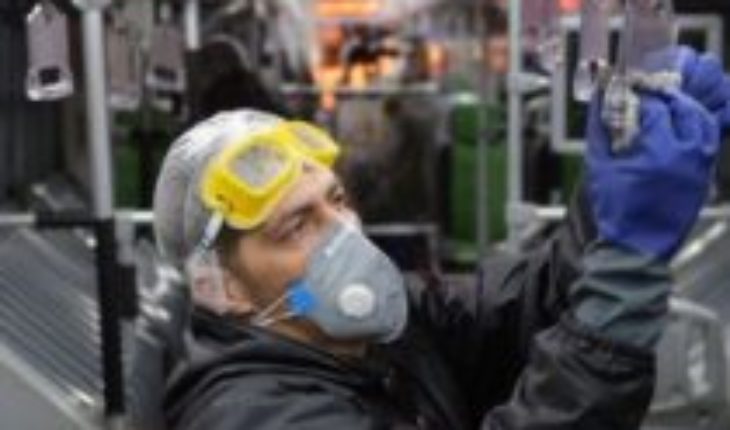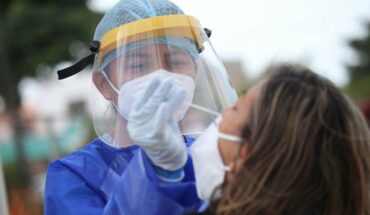
The new coronavirus is already found on all continents except Antarctica, and for the first time is spreading more rapidly outside China than in the country where it was first detected.
As of Saturday, the new coronavirus had infected more than 83,000 people and killed 2,858, most of them in China, according to data published by the World Health Organization (WHO).
In Latin America, there are already confirmed cases in Brazil, Mexico and Ecuador.
On Friday, WHO raised the risk of global expansion of coronavirus to “very high.”
However, UN Secretary-General António Guterres called for “panic,” calling for “all governments to step up and do everything they can to contain the disease, and to do so without stigma and respecting human rights.”
In large cities, where people live and work side by side, the possibility of an outbreak is a real cause for concern.
Here are some of the challenges facing cities around the world and a review of how they are facing them.
Thailand’s Parliament was disinfected after a lawmaker, Cholnan Srikaew, revealed that he had returned from a trip to Japan.
Public transport
Public transport systems create the perfect environment for virus transmission.
Viruses are thought to spread primarily when droplets of body fluid land on shared surfaces after someone coughs or sneezes.
Studies looking at flu seasons suggest that people who use public transportation during flu outbreaks are up to six times more likely to get an acute respiratory infection.
That’s why the authorities, from South Korea to Italy and Iran, have ordered the massive clean-up of surfaces within trains, buses and stations.
Large crowds
Japan asked the population to avoid crowds, such as sporting events.
Events that attract large crowds are clear places of possible contagion and are already being affected by the new coronavirus.
In Ecuador, where the first case of covid-19 was confirmed on Saturday, the government suspended mass events in the coastal cities of Babahoyo and Guayaquil, both in the southwest of the country, where the first affected person was detected, the agency EFE reported.
The Ecuadorian authorities called for “citizen co-responsibility” and “strengthening precautionary measures”.
On the contrary, Chile’s health minister, Jaime Mañalich, said on Friday that given the context of protests in the country, with constant demonstrations in the streets, banning concentrations of people as a prevention against coronavirus would be “absurd”.
On the European continent, France, for its part, announced on Saturday that it bans the events of more than 5,000 people in a closed location.
In addition, all collective events in the main areas affected by coronavirus, such as the Oise region in the north, were cancelled, and others that could be attended by residents in those areas, such as the Paris half marathon to be held this Sunday.
The REAL estate exhibition MIPIM de Canes (France), scheduled for 10-13 March, and the Venetian Carnival of Annecy, which was to take place from 6 to 8 March, was also suspended.
Some sporting events are played without an audience, such as this Swiss National Jockey League match, in the face of the government’s ban on games with audiences over 1,000 people.
The outbreak also affects the holding of sporting events, such as the postponement of china’s Formula One Grand Prix in Shanghai.
Six Asian Champions League games were also postponed, affecting four Iranian teams.
In Europe, rugby and football matches involving Italian teams were also suspended.
But the biggest interruption in the world sports calendar could be the Tokyo Olympics, which will begin on July 24.
So far, only the pre-Olympic torch relay has been modified, but the International Olympic Committee has not ruled out cancelling the Olympic event if the new coronavirus becomes a serious pandemic.
In addition to sports, religious events are also subject to restrictions.
Saudi Arabia, for example, banned foreign pilgrims from entering the holy city of Mecca and Medina.
Schools
Schools in several countries, such as Thailand, Iran, Iraq, Italy and the United Kingdom closed.
Increasingly, governments are advising schools to set out plans to tackle the epidemic.
In countries such as Japan, Thailand, Iran and Iraq, schools and universities have temporarily closed to deal with the outbreak.
The UK and the US are not recommending closures, but four schools in England suspended classes for a “deep clean”following the return of some of their students from their ski trips in Italy.
Parents who have recently traveled with their children to the hardest-hit areas — such as Iran, China, Hong Kong, South Korea, Southeast Asia, and northern Italy — are advised to stay sheltered and not send their children to school.
Offices
In some countries, employees are being encouraged to work from home.
The new coronavirus is affecting business practices in some of the world’s leading technology centers.
In San Diego and San Francisco, who have declared a public emergency, employees are advised not to shake hands with visitors to their businesses.
Facebook has canceled an annual marketing conference scheduled for March, and several major sponsors and exhibitors have dropped out of one of the world’s largest cybersecurity conferences, which takes place in San Francisco.
The U.S. Centers for Disease Control and Prevention (CDC) has recommended employers to advance work from home, especially if they have a fever or signs of breathing problems.
Telework is another option promoted by companies in Spain.
Public awareness and prevention
Washing your hands thoroughly is an essential precautionary measure.
Increasing public awareness of the importance of precautionary measures, such as washing your hands well, is a key part of the fight against the transmission of the new coronavirus, according to US health authorities.
According to the World Health Organization (WHO), to prevent the spread of coronavirus,:
wash your hands regularly
cover your mouth and nose when you cough or sneeze
avoid contact with people who have symptoms of breathing problems
avoid unprotected contact with wild or farm animals
In the Latin American region, steps have also been taken on the path of prevention.
Among other initiatives, Mexico envisages the conduct of drills and a greater dissemination of information to the population. AMLO announced that there will be daily evening conferences to report on the new coronavirus, BBC country correspondent Marcos Gonzalez said.
Many countries have also implemented new controls at border posts and travel restrictions.
Paraguay, for example, activated on Friday a scanner control system for flights from coronavirus-sab countries and the Dominican Republic, for its part, suspended flights from Milan for 30 days due to the increase in coronavirus cases in Italy.
Hospitals
Because there is no treatment or cure for the new coronavirus, hospitals are trying to relieve symptoms.
The advice is to put patients in isolation and ensure that staff wear protective clothing when it comes to potential cases.
This was the case in Brazil, where the Justice of Rio de Janeiro ordered a couple of Frenchmen to remain in detention in a hospital in Paraty, one of the country’s most paradisiccated spas, while checking whether they are infected with the new coronavirus.
For their part, the health authorities of Canada decided to prevent the hospitalization of persons infected with covid-19 unless it is essential and have in most cases chosen to decree isolation in their homes.
In the US and the UK they predict that if a massive outbreak occurs, hospitals could delay non-urgent procedures and increase telephone consultations.
There are concerns about how some hospitals will cope with an increase in the number of patients, when their services are already saturated.
Isolation measures
In the UK, people travelling from affected areas are asked to quarantine them.
The Chinese city of Wuhan, the epicenter of the current outbreak, remains isolated, as do the hardest-hit cities in northern Italy.
Travellers from affected areas are subjected to border controls.
But experts say that as the virus spreads globally, such restrictions will be less effective.
They are also difficult to replicate elsewhere.
“Few countries, if any, could logistically isolate cities like China has done,” Tom Inglesby, the director of the Johns Hopkins Center for Health Security in the United States, said on Twitter.
Inglesby argues that “closures carry the risk of separating families from each other and disrupting the delivery of medicines, food and other basic supplies.”
“They can block the movement of doctors, nurses and medical supplies to hospitals, as reported in China,” he said.





